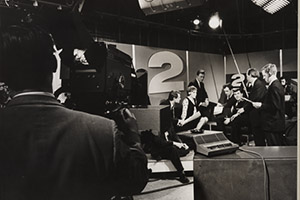
History-Periods
Past eras

From pre-history to today
Choose your period

Periods of History
explore the different eras

ITV (Independent Television) and BBC2 are two of the major television channels in England, with ITV being the first commercial TV channel in the UK and BBC2 being the third national channel. Here's a brief overview of their formation and launch:
ITV:
In the early 1950s, the British Broadcasting Corporation (BBC) had a monopoly on television broadcasting in the UK. However, in 1954, the Television Act was passed, which allowed for the creation of commercial TV channels. This led to the formation of Independent Television (ITV), which was launched in 1955.
ITV was created through a network of regional franchises, with each franchisee responsible for producing programming for their specific region. The first region to launch was London on September 22, 1955, followed by the Midlands and the North of England in 1956, and the rest of the country in the years that followed.
The launch of ITV was met with both excitement and criticism. Some people were happy to have an alternative to the BBC, while others were concerned about the potential impact of commercial interests on television programming.
BBC2:
BBC2 was launched in 1964 as the third national TV channel in the UK, following the success of ITV. Its launch was part of a wider effort by the BBC to expand its television offering and compete with the commercial channels.
One of the unique features of BBC2 was its focus on more highbrow and educational programming, as opposed to the entertainment and variety shows that were popular on BBC1 and ITV. BBC2 also pioneered the use of color television in the UK, with its first color broadcast taking place in 1967.
The launch of BBC2 was not without its challenges. There were technical difficulties with the color broadcasts, and the channel struggled to find an audience in its early years. However, it eventually found its footing and became an important part of the UK's television landscape.
Today, both ITV and BBC2 continue to be major players in the UK's television industry, offering a range of programming to audiences across the country.
The main difference between ITV, BBC2, and the BBC is their ownership, funding, and programming focus.
The BBC is a publicly-funded broadcaster that operates as a non-profit organization. It is funded by a license fee paid by all UK households that own a television, and its programming is not interrupted by commercial advertising. The BBC operates several television channels and radio stations, offering a wide range of programming, including news, current affairs, drama, comedy, documentaries, and entertainment.
ITV, on the other hand, is a commercial broadcaster that generates revenue primarily through advertising. Its programming is interrupted by commercial breaks, and its focus is on popular entertainment and drama, although it also includes news and current affairs programming. ITV originally operated as a network of regional franchises, but these have since been consolidated into a single entity.
BBC2, which launched in 1964, was created as a more intellectual and highbrow channel than the BBC's flagship channel, BBC One. It has a focus on arts, culture, and educational programming, and is funded by the same license fee as the BBC's other channels. Unlike ITV, it does not carry commercial advertising.
Overall, the key differences between the BBC, ITV, and BBC2 are their ownership and funding models, and the programming focus of each channel. While the BBC is a public service broadcaster funded by the license fee, ITV is a commercial broadcaster funded by advertising, and BBC2 is a more niche channel with a focus on arts, culture, and education.
In the early days of television in the UK, the BBC held a monopoly on broadcasting. This meant that they were the only channel broadcasting in the country, and they were funded by a combination of license fees and government subsidies. However, in the 1950s, the government began to consider introducing competition to the BBC in the form of a commercial television network.
The main motivation behind this move was to create more choice for viewers and to stimulate the development of a commercial television industry in the UK. There were concerns that the BBC's monopoly was stifling innovation and creativity, and that the introduction of a rival network would encourage competition and lead to higher-quality programming.
In 1954, the Television Act was passed, which paved the way for the creation of Independent Television (ITV). This new network would be funded by advertising revenue rather than license fees, and would compete directly with the BBC for viewers.
ITV launched in 1955, and quickly established itself as a popular alternative to the BBC. It was initially made up of a network of regional franchises, each owned by different companies and broadcasting to specific areas of the country. This meant that ITV offered a diverse range of programming, tailored to local audiences.
In 1964, the government launched another new channel, BBC2. This was created in response to concerns that the BBC was not catering to all segments of the audience, particularly those with more intellectual or niche interests. BBC2 was designed to be a more highbrow and innovative channel, with a focus on arts, culture, and education.
Both ITV and BBC2 have become major players in the British television industry, and have helped to shape the country's cultural landscape over the past few decades.
If you have a suggestion regarding additional topics you would like to see included - please let us know
Reference: Article by Greg Scott (Staff Historian), 2024
Tour Reviews
History Attractions
Submit Tour Suggestions
2024 Departures
Spotlight Tours
Events and anniversaries

All content and images are protected by copyright to Access History